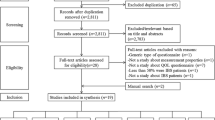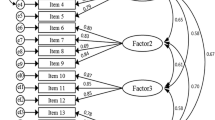Abstract
Purpose
This paper is aimed to develop the irritable bowel syndrome (IBS) scale of the system of Quality of Life Instruments for Chronic Diseases (QLICD-IBS) by the modular approach and validate it by both classical test theory and generalizability theory.
Methods
The QLICD-IBS was developed based on programmed decision procedures with multiple nominal and focus group discussions, in-depth interview, and quantitative statistical procedures. One hundred twelve inpatients with IBS were used to provide the data measuring QOL three times before and after treatments. The psychometric properties of the scale were evaluated with respect to validity, reliability, and responsiveness employing correlation analysis, factor analyses, multi-trait scaling analysis, t tests and also G studies and D studies of generalizability theory analysis.
Results
Multi-trait scaling analysis, correlation, and factor analyses confirmed good construct validity and criterion-related validity when using SF-36 as a criterion. Test-retest reliability coefficients (Pearson r and intra-class correlation (ICC)) for the overall score and all domains were higher than 0.80; the internal consistency α for all domains at two measurements were higher than 0.70 except for the social domain (0.55 and 0.67, respectively). The overall score and scores for all domains/facets had statistically significant changes after treatments with moderate or higher effect size standardized response mean (SRM) ranging from 0.72 to 1.02 at domain levels. G coefficients and index of dependability (Ф coefficients) confirmed the reliability of the scale further with more exact variance components.
Conclusions
The QLICD-IBS has good validity, reliability, responsiveness, and some highlights and can be used as the quality of life instrument for patients with IBS.
Similar content being viewed by others
References
Longstreth GF, Thompson WG, Chey WD et al (2006) Functional bowel disorders. Gastroenterology 130:1480–1491
Saito YA, Schoenfeld P, Locke GR 3rd (2002) The epidemiology of irritable bowel syndrome in North 1America: a systematic review. Am Gastroenterol 97:1910–1915
Locke GR 3rd, Yawn BP, Wollan PC et al (2004) Incidence of a clinical diagnosis of the irritable bowel syndrome in a United States population. Aliment Pharmacol Ther 19:1025–1031
Schmulson M, Ortiz O, Santiago-Lomeli M et al (2006) Frequency of functional bowel disorders among healthy volunteers in Mexico City. Dig Dis 24:342–347
Vandvik PO, Lydersen S, Farup PG (2006) Prevalence, comorbidity and impact of irritable bowel syndrome in Norway. Scand Gastroenterol 41:650–656
Chang FY, Lu CL (2007) Irritable bowel syndrome in the 21st century: perspectives from Asia or South-east Asia. Gastroenterol Hepatol 22:4–12
Chen MX, Cai G (2011) Evaluation of health-related quality oflife in patients with irritable bowel syndrome: research status and prospects. Shijie Huaren Xiaohua Zazhi 19(1):1–6
Sandler RS (1990) Epidemiology of irritable bowel syndrome in the United States. Gastroenterology 99:409–415
Hahn BA, Kirchdoerfer LJ, Fullerton S et al (1997) Evaluation of a new quality of life questionnaire for patients with irritable bowel syndrome. Aliment Pharmacol Ther 11:547–52
Hahn BA, Kirchdoerfer LJ, Fullerton S et al (1997) Patient-perceived severity of irritable bowel syndrome in relation to symptoms, health resource utilization and quality of life. Aliment Pharmacol Ther 11:553–9
Patrick DL, Drossman DA, Frederick IO et al (1998) Quality of life in persons with irritable bowel syndrome—development and validation of a new measure. Dig Dis Sci 43:400–11
Wong E, Guyatt G, Cook DJ et al (1998) Development of a questionnaire to measure quality of life in patients with irritable bowel syndrome. Eur J Surg suppl 583:50–6
Groll S, Vanner AJ, Depew WT et al (2002) The IBS-36: A new quality of life measure for irritable bowel syndrome. Am J Gastroenterol 97(4):962–971
Chassany O, Marquis P, Scherrer B et al (1999) Validation of a specific quality of life questionnaire for functional digestive disorders. Gut 44:527–33
Svedlund J, Sjodin I, Dotevall G (1988) GSRS-A clinical rating scale for gastrointestinal symptoms in patients with irritable bowel syndrome and peptic ulcer disease. Dig Dis Sci 33:129–34
Sprangers MA, Cull A, Groenvold M et al (1998) The European Organization for Research and Treatment of Cancer approach to developing questionnaire modules: an update and overview. EORTC Qual Life Study Group Qual Life Res 7(4):291–300
Cella DF, Tulsky DS, Gray G et al (1993) The functional assessment of cancer therapy scale: Development and validation of the general measure. J Clin Oncol 11(3):570–579
Cella D, Nowinski CJ (2002) Measuring quality of life in chronic illness: the functional assessment of chronic illness therapy measurement system. Arch Phys Med Rehabil 83(12 Suppl 2):S10–S17
Wan CH, Tu XM, Messing S et al (2011) Development and validation of the General Module (QLICD-GM) of the System of Quality of Life Instruments for Chronic Diseases and Comparison with SF-36. J Pain Symptom Manag 42(1):93–104
Wan CH, Jiang RS, Tu XM et al (2012) The Hypertension Scale of the System of Quality of Life Instruments for Chronic Diseases QLICD-HY: development and validation study. Int J Nurs Stud 49(4):465–480
Drossman DA, Talley NJ, Whitehead WE, et al. Research diagnostic questions for functional gastrointestinal disorders: Rome II Modular Questionnaire: investigations and Respondent Forms. In Rome II The Functional Gastrointestinal Disorders 2nd edition. Edited by: Drossman DA, Corazziari E, Talley NJ, Thompson WG, Whitehead WE. McLean, VA:Degnon Associates; 2000:669-714.
Yang Z, Li W, Tu XM et al (2012) Validation and psychometric properties of Chinese version of SF-36 in patients with hypertension, coronary heart diseases, chronic gastritis and peptic ulcer. Int J Clin Pract 66(10):991–998
Hays RD, Hayashi T (1990) Beyond internal consistency reliability: rationale and use’s guide for multi-trait analysis program on the microcomputer. Behav Res Methods Instrum Comput 22:167–175
McGraw KO, Wong SP (1996) Forming inferences about some intraclass correlation coefficients. Psychol Methods 1(1):30–46
Schuck P (2004) Assessing reproducibility for interval data in health-related quality of life questionnaires: which coefficient should be used? Qual Life Res 13:571–586
Terwee CB, Dekker FW, Wiersinga WM et al (2003) On assessing responsiveness of health-related quality of life instruments: guidelines for instrument evaluation. Qual Life Res 12(4):349–363
Husted JA, Cook RJ, Farewell VT et al (2000) Methods for assessing responsiveness: a critical review and recommendations. J Clin Epidemiol 53(5):459–468
Winterstein BP, Willse JT, Kwapil TR et al (2010) Assessment of score dependability of the Wisconsin Schizotypy Scales using generalizability analysis. Psychopathol Behav Assess 32:575–585
Stora B, Hagtvet KA, Heyerdahl S (2013) Reliability of observers’ subjective impressions of families: a generalizability theory approach. Psychother Res 23(4):448–63
Crits-Christoph P, Johnson J, Gallop R et al (2011) A generalizability theory analysis of group process ratings in the treatment of cocaine dependence. Psychother Res 21(3):252–66
Heitman RJ, Kovaleski JE, Pugh SF (2009) Application of generalizability theory in estimating the reliability of ankle-complex laxity measurement. J Athl Train 44(1):48–52
The WHOQOL Group (1998) The Word Health Organization Quality of Life assessment (WHOQOL): Devolvement and psychometric properties. Soc Sci Med 46(12):1569–1585
Acknowledgments
This study was supported by the National Natural Science Foundation of China (grants 30860248 and 71373058) and Key Discipline and Science and Technology Innovation Fund of Guangdong Medical College (grants XZ1111 and STIF201119). In carrying out this research project, we have received substantial assistance from staffs of the First Affiliated Hospital of Kunming Medical University and Songgong Hospital. We sincerely acknowledge all the support.
Conflict of interest
None declared.
Author information
Authors and Affiliations
Corresponding authors
Additional information
Pingguang Lei and Guanghe Lei are the first co-author with the same contributions.
Rights and permissions
About this article
Cite this article
Lei, P., Lei, G., Tian, J. et al. Development and validation of the irritable bowel syndrome scale under the system of quality of life instruments for chronic diseases QLICD-IBS: combinations of classical test theory and generalizability theory. Int J Colorectal Dis 29, 1245–1255 (2014). https://doi.org/10.1007/s00384-014-1976-x
Accepted:
Published:
Issue Date:
DOI: https://doi.org/10.1007/s00384-014-1976-x




